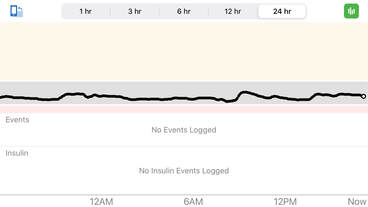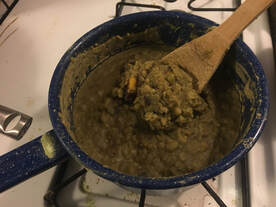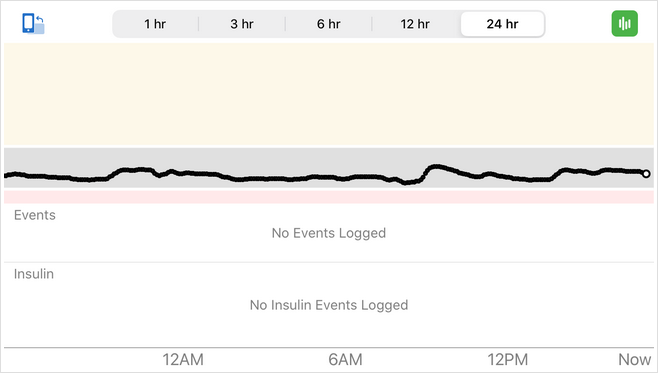 Stable blood sugar is a beautiful thing! Stable blood sugar is a beautiful thing! For the last ten years or so I've struggled with reactive hypoglycemia related to CFRD (cystic fibrosis-related diabetes). In the last couple of years it has become very difficult to manage. Reactive hypoglycemia is a condition where the blood sugar crashes 1-3 hours after a meal containing carbohydrates, leading to distressing hypoglycemia symptoms such as shakiness, anxiety, weakness, brain fog, fatigue, tachycardia, and in severe cases, unconsciousness or even coma. Reactive hypoglycemia is more common in CFRD than many CF-specialists realize. Despite avoiding simple carbohydrates and adhering to a Paleo-ish diet for many years, my reactive hypoglycemia has only gotten worse. That is, until I started a ketogenic diet in October of 2020. I've made a remarkable improvement in my blood sugar control and I'd like to report my success in detail here. Since October 2019 when I began taking Trikafta, my hypoglycemia got even more out of control. Trikafta is a new drug that corrects the fundamental cellular defect in cystic fibrosis (CF), and I suspect that the sudden resolution of my systemic inflammation related to CF improved my insulin sensitivity to the point where my pancreas's relative production of insulin was too high for the amount of carbohydrate I was eating. In September 2020, I decided to try a low-carbohydrate diet, rationing down to 75g carbs per day, but I was still having 1-4 daily hypoglycemic events (that is, blood glucose less than 70 mg/dL). Not even my continuous glucose monitor could help me prevent them from happening. Finally, after a helpful conversation with a friend who was using the ketogenic diet to treat her autoimmune disorder, I decided to go ahead and try it. I wish I had done it long ago! Getting Started I suppose I waited so long to give it a try for two reasons: 1) the scary, misleading information you find on the internet put out by institutions who still believe high-carb diets are most suitable for diabetics (I know, unbelievable, right?); 2)I thought it would be "too hard" and I doubted that I had the discipline to stick with it. I did a lot of research, as usual, and found no hard evidence to dissuade me from trying it. No studies have shown any long-term negative effects from the diet, but there are several things to know before trying it. First, there can be short-term uncomfortable symptoms if the person does not pay attention to hydration, electrolytes, micro- and macronutrient requirements necessary for a balanced diet. This could manifest as temporary muscle spasms, fatigue, flu-like symptoms, etc. I did not experience any of these except for heart palpitations, which I will discuss later on. Second, children using ultra-low carb diets for treatment of epilepsy tended to have a higher incidence of kidney stones, likely due to a reduction of citrate in the diet, dehydration, and a higher proportion of oxalate-containing foods such as nuts (this is avoidable, by the way). I pay attention to this because I have a history of kidney stones. Third, those with kidney disease need to take caution because a diet high in proteins can put stress on the kidneys (kidneys are responsible for filtering protein from the blood). This is not a comprehensive list of cautions or contraindications, so please do your own research (reading primary source material such as clinical studies and articles written by ketogenic diet experts) before embarking on this journey. Because I started with a low-carb (<75g carb/day) diet and slowly transitioned towards a ketogenic diet, I did not have any severe symptoms you might read about related to the "keto flu". I also believe that because my body had spent years going in and out of hypoglycemia, it's likely I was mildly keto-adapted already, allowing the transition to be smoother. It took about two weeks for me to get into a routine of eating only ~40g of carbs per day because I was still having frequent lows for these first weeks, so I was regularly having to correct my lows with carbs, which would bump me over the 40g mark. The use of a continuous glucose monitor was helpful, as I learned which foods would cause my blood sugar to increase too quickly. Any food that hard simple sugars in them would cause my glucose meter to have an arrow-up symbol, which would almost guarantee that I'd get a crash in 1-2 hours, even if the total carb load was low, like less than 20g. So I learned how to choose foods that only rose my by very slowly, without making arrow turn upward. Having glucose tabs on hand instead of food to correct was helpful, because the dose of glucose can be most closely controlled that way. Usually I only need a half-tab (2g) to correct a low. Improvement For the first week my blood sugar was still unstable, but after about 2 weeks I noticed that my pancreas was learning how to produce less insulin in response to carbs. I believe that previously my pancreas was producing too much insulin, and slightly delayed, so that there would be an insulin overshoot disproportionate to my blood sugar level, causing a crash. At this point I was no longer having frequent lows and could go many hours without eating. What was particularly relieving was to have my BS stay steady all night long - I cannot tell you how important that was to me! For months I was having the problem of being woken up multiple times a night by my glucometer shouting at me to correct my BS. It was causing me serious anxiety, because my CGM wouldn't always catch the lows, and I developed a profound fear that I would slip into a hypoglycemic coma while asleep and no one would find me until it was too late (I live alone). I cannot tell you how grateful I am that the keto diet has solved this problem for me! I was truly afraid for my life. I got into the groove of the keto diet pretty quickly, for after the first couple days it became very easy to maintain. I was already low-carb and Paleo, so I didn't have to give up many things that I love to eat, and one of the great things about keto is that if you do it right, you never feel hungry! I have no more food cravings, which is a nice relief after a lifetime of trying to resist my cravings for sweets. I also think that my systemic body inflammation has improved, as I used to wake up every morning with sore muscles. Only once in the last three months have I felt hypoglycemia symptoms, and only once has my BS gone below 55 mg/dL. That's amazing! Beforehand I was regularly dipping into the low 50's, or even lower in some extreme situations (I think I've gone as low as 34). Even before keto, I've never gone super high because I have been controlling my carbs for years, but occasionally I'd get about 200 mg/dL or as high as 300 (with a crash sure to follow). Since starting keto, I rarely let my BS get above 120, and most of the time it's in the 70 to 100 range. In May 2020, my hemoglobin A1c was 5.9%, in September it was 5.5%, and at the end of December (about 2.5 months since starting the keto diet) it was 5.2%. Wow! I did notice, however, that I had to readjust how I define hypoglycemia for myself. As I mentioned, I basically never get hypoglycemia symptoms anymore (my primary symptom was brain fog) and my mind is sharp as a tack 100% of the time, unless I'm tired from overexertion. Most nights I drift into the 55-65 mg/dL range, but it never gets dangerously low like it did before. I got some advice from an endocrinologist specializing in ketosis, and she said if you're in ketosis, even as low as 55 mg/dL is not dangerous. This made me feel a lot better. So once I got my ketone meter and actually started measuring my ketone levels, proving that I was indeed in ketosis, I turned the low glucose alarm off on my phone (the dangerously-low alarm stays on) and started sleeping through the night again. Yipee! What I'm eating now If you look up the keto diet on the internet, you're likely going to find some celebrity making super elaborate, super expensive gourmet keto meals for themself. I think there are a few misconceptions about the keto diet, a couple of them being that it's hard to maintain (it's not, because you don't get hungry and you don't get cravings), and that it's only for rich people because you have to start buying expensive foods and fancy proprietary products. I am not rich by any stretch of the imagination and I buy zero packaged or proprietary ketogenic products. In fact, going ketogenic has helped me shrink my food budget and reduce my food-container waste significantly because I mainly eat fresh veggies, bulk nuts, butter, and meats. In fact, I eat less than I've ever eaten before (average 1000-1400 calories per day) and my weight is rock-steady (though I wish I could lose a little bit of this COVID pudge! Haha). I know one of the things people with CF need to be cautious about is maintaining weight, and perhaps if I wasn't on Trikafta I would be struggling with this a little more. Eating carbohydrates is the primary way our bodies create fat stores, so if you're someone who tends to be underweight, make sure you get in plenty of calories in the form of fat and protein. If you find yourself losing too much weight, or being unable to keep weight on while on a ketogenic diet, it may not be the right choice for you. Instead, a moderately low-carb (like 75-100g carbs/day) might be a safer choice. Everyone needs a different diet tailored to their specific constitution, and if you need help figuring this out, I'd be more than happy to consult with you.Consultation Alright, so here is what I eat on a daily basis, give or take...
This looks kinda boring, I know, but the good thing is that when I eat this way I never crave foods or get hungry, so I don't really care! Occasionally I want something more exciting, so I'll share a meal with my sister once a month. I ought to mention peas pudding here because it has been the silver bullet to my reactive hypoglycemia, and has helped me transition to a ketogenic diet. It's basically soaked split peas boiled with half a carrot, a little onion, and salt (plus optional broth) until it becomes a consistency like mashed potatoes. Not only is it delicious, but because it's got a lot of fiber it gives a very slow release of carbs that maintains stable BS over many hours. I use a simplified version of this recipe. I make a big batch of it and keep it in the fridge, eating a spoonful here and there as necessary.  Peas pudding Peas pudding I was surprised to note that I slipped into ketosis way quicker than I thought I would, and at carb levels I had read were too high. I tend to average about 45g carbs/day, but I get a ketone reading of 1-3.5 every day. I think my body is really happy to be in ketosis, so perhaps it's easier for me to get into than others. I suspect the years of being in and out of hypoglycemia actually helped this out. So I think I was getting into states of mild to moderate ketosis within 2-4 weeks of starting the diet. Side Effects As I mentioned, I did not have the "keto flu" side effects others commonly report. In fact, I only had one side effect, but I'm not exactly sure it was due to the diet. It could have been the result of some stress I was feeling around the time of starting the diet, but there could be a connection, so I'll note it here. About 4 weeks into the diet I was getting a heart arrhythmia that I suspected was premature ventricular contractions. It felt like my heart was skipping a beat dozens of times per day, and it was really freaking me out. I did a lot of research on the topic and found that they can often be cured by taking magnesium. So I took 800mg of magnesium per day, and 2 weeks later they were completely gone. It is common to have electrolyte imbalances when first starting the keto diet, so make sure you are drinking enough water and taking electrolytes if you need to. Being in ketosis changes how our bodies retain fluids. Conclusion After using the ketogenic diet for about three months now, I have found it to be the most effect thing I've tried to address my reactive hypoglycemia. My research also suggests this to be safe over the long term, as people with epilepsy have been using a version of the keto diet since the 1930's with relatively good safety and efficacy. The human species has the ability to dwell in a ketogenic state for long periods of time because it has helped our ancestors adapt to times of food scarcity and climates lacking year-round sources of plant carbohydrates. I had mild side effects in the beginning which have since resolved. I strongly believe a ketogenic diet or low-carb diet can help address hypoglycemia or other blood sugar disorders, however please do your research and make sure it is suitable for your body. The ketogenic diet is not a panacea. Resources If you'd like to learn more about the keto diet, here are a few resources to check out. Again, this is not a comprehensive list.
If you try a keto diet to address your blood sugar imbalances, let me know how it goes. Good luck!
1 Comment
|
Author
Mica (they/he) is a clinical herbalist, nutritionist, researcher, and writer living in Abenaki territory (Vermont). *************************** Disclaimer: The content of this website and blog is for educational purposes only and should not be considered medical advice. The information provided here is not intended to replace medical care. Archives
July 2024
Categories
All
|
Photo from BotanikGuide

 RSS Feed
RSS Feed
